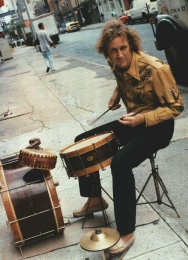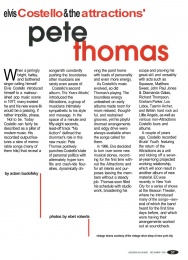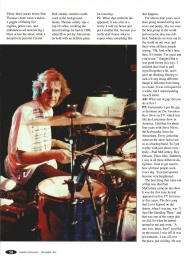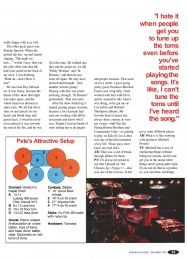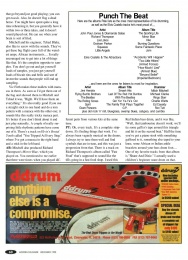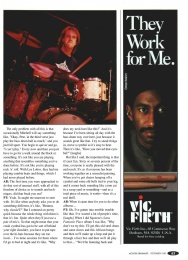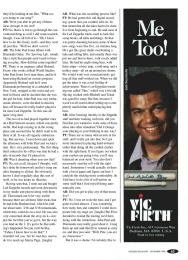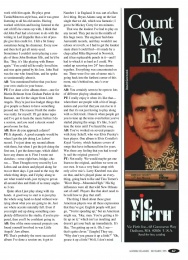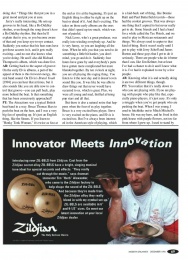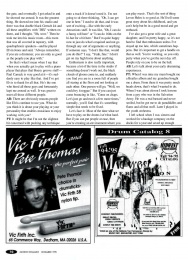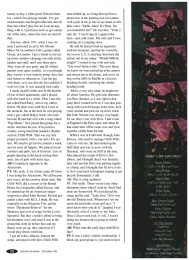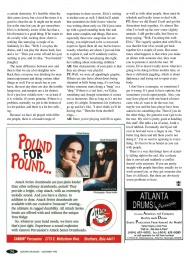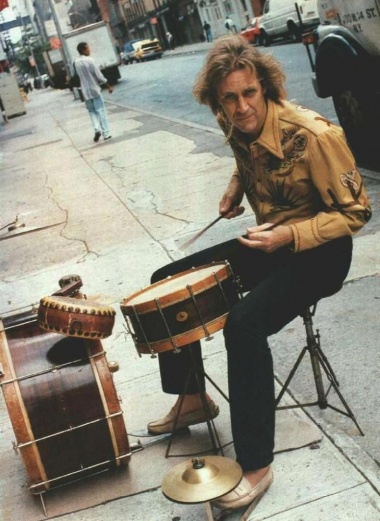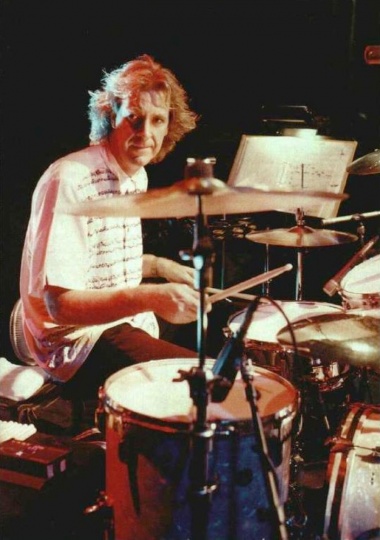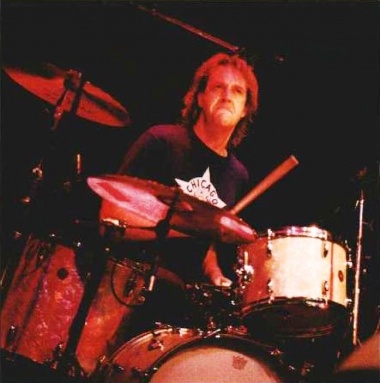Modern Drummer, December 1995: Difference between revisions
(+pics +text part 1) |
(+text part 2) |
||
| Line 19: | Line 19: | ||
In 1986, Elvis decided to turn over some new musical stones, recording for the first time without the Attractions and for all intents and purposes leaving the members without a steady job. Thomas soon filled his schedule with studio work, broadening his scope and proving his great skill and versatility with acts such as Squeeze, Matthew Sweet, John Paul Jones & Diamanda Galas, Richard Thompson, Graham Parker, Los Lobos, Tasmin Archer, and British hard rock act Little Angels, as well as various non-Attractions Costello tours and albums. | In 1986, Elvis decided to turn over some new musical stones, recording for the first time without the Attractions and for all intents and purposes leaving the members without a steady job. Thomas soon filled his schedule with studio work, broadening his scope and proving his great skill and versatility with acts such as Squeeze, Matthew Sweet, John Paul Jones & Diamanda Galas, Richard Thompson, Graham Parker, Los Lobos, Tasmin Archer, and British hard rock act Little Angels, as well as various non-Attractions Costello tours and albums. | ||
A couple of years ago, Costello recorded ''Brutal Youth'', featuring the return of the Attractions as a unit and kicking off a several-year-long projected working relationship, which will soon result in another album of new material. EC was recently in New York City for a series of shows at the Beacon Theater, where he introduced many of the | A couple of years ago, Costello recorded ''Brutal Youth'', featuring the return of the Attractions as a unit and kicking off a several-year-long projected working relationship, which will soon result in another album of new material. EC was recently in New York City for a series of shows at the Beacon Theater, where he introduced many of the songs — several of which the band heard for the first time days before, and which were having their arrangements worked out at soundcheck. | ||
Thirty-three stories below Pete Thomas's hotel room window, a gaggle of blaring fire engines, police cars, and ambulances are announcing a blaze across the street, while a deceptively pastoral Central Park silently stretches northward in the background. Inside, Thomas calmly sips a cup of coffee, recalling the mixed feelings he had in 1986, when Elvis put the Attractions on hold with no definite plans for reuniting. | |||
"When that umbrella disappeared, it was a bit of a worry. I sold my house and got a smaller flat, because you really don't know what to expect when something like that happens. | |||
For almost nine years we'd been going around acting new wave and punky, like we were the best group in the world and everyone else was rubbish. Suddenly we were out in the world on our own, and there were all these people saying, "Oh, look who's here, then. It's mister 'I'm great and you're not.'" [laughs] But it was good for me in a way. I realized that I had to pull myself together a bit, and I gave up drinking. Having to earn a living doing different things is different from being in a band. It was a bit quiet for a while, but I started putting myself about. | |||
''What sort of gigs did you do at first? | |||
Fortunately I got the gig as drummer on ''The Jonathan Ross Show'' on TV, which was like the ''Letterman'' show in America. I did that for about four years with Steve Nieve, the keyboardist from the Attractions. Every artist that came on the show had to use us as a backup band. So I got to play with just about everybody — Paul McCartney, Roy Orbison, Elton John. Suddenly I was in all these different disciplines. I had to get used to how all these people work, every day. Your perceptions become very heightened. | |||
The best thing that came out of that was that Paul McCartney came on the show. It was the first time he had appeared on live TV for twenty-five years. The first song that I ever learned on the drums, when I was ten, was "I Saw Her Standing There," and that was one of the songs that we did. So when he turned around to me and went, "A-one, two, three, four!" just like on the record, I was off. It was just fantastic. I was all over the place, just wailing. He was really happy with it as well. | |||
The other great guest was Ronnie Spector. When she picked the mic' up and started singing, "The night we met...." in that voice, that was the only other time that the hairs just stood on the back of my neck. I was thinking, "Hold on — don't blow it now!" | |||
We also had Roy Orbison on. It was funny, because the theme of the show that night was outer space, and the whole band was dressed as space men. We all had silver suits on and aerials on our heads and blond wigs and green faces. I swear he never even noticed; it was towards the end of his life, and he was ill at the time. He walked out, they put his guitar on, we did "Pretty Woman" and "In Dreams," and then he just went off again. He may have noticed and thought, "Just another weirdo group." Playing with him was pretty amazing, though, "In Dreams" particularly. That was eerie. | |||
After the show folded up, I started getting proper sessions, because a lot of people had seen me working with different people and knew who I was. People I'd never heard of were asking me to do jingles and proper sessions. That went on for a while. I got it going pretty good. Producer Mitchell Froom was a big help. I had worked with him with Elvis, and he seemed to like what I was doing, so he got me on Los Lobos and Richard Thompson albums. My favorite kind of music has always been country & western swing — stuff like the Flying Burrito Brothers and Commander Cody — so getting to play on ''Kiko'' by Los Lobos was one of the best moments of my life. Those guys don't know any bad licks. | |||
''That was a sort of breakthrough album for them. | |||
I'll always be proud to say that I played on "the Chicano ''Sgt. Pepper's''" — that was one of the reviews. It did go to some different places. | |||
''What is it like working with producer Mitchell Froom? | |||
Mitchell has a way of explaining things without being too serious, and he can get you in the mood when things aren't going quite right. If you can do that as a producer, you can draw out things | |||
| Line 25: | Line 52: | ||
{{rttc}} | {{rttc}} | ||
{{tags}}[[This Year's Model]] {{-}} [[The Attractions]] {{-}} [[No Action]] {{-}} [[Squeeze]] {{-}} [[Graham Parker]] {{-}} [[Richard Thompson]] {{-}} [[Los Lobos]] {{-}} [[Matthew Sweet]] {{-}} [[John Paul Jones]] {{-}} [[Tasmin Archer]] {{-}} [[Brutal Youth]] {{-}} [[Beacon Theatre]] | {{tags}}[[This Year's Model]] {{-}} [[The Attractions]] {{-}} [[No Action]] {{-}} [[Squeeze]] {{-}} [[Graham Parker]] {{-}} [[Richard Thompson]] {{-}} [[Los Lobos]] {{-}} [[Matthew Sweet]] {{-}} [[John Paul Jones]] {{-}} [[Tasmin Archer]] {{-}} [[Brutal Youth]] {{-}} [[Beacon Theatre]] {{-}} [[New York]] {{-}} [[The Jonathan Ross Show]] {{-}} [[Steve Nieve]] {{-}} [[Paul McCartney]] {{-}} [[Roy Orbison]] {{-}} [[Elton John]] {{-}} [[I Saw Her Standing There]] {{-}} [[Oh, Pretty Woman|Pretty Woman]] {{-}} [[Mitchell Froom]] {{-}} [[The Flying Burrito Brothers]] {{-}} [[Commander Cody]] | ||
{{cx}} | {{cx}} | ||
{{Bibliography notes header}} | {{Bibliography notes header}} | ||
| Line 68: | Line 94: | ||
[[image:1995-12-00 Modern Drummer photo 02 er.jpg|380px|border]] | [[image:1995-12-00 Modern Drummer photo 02 er.jpg|380px|border]] | ||
[[image:1995-12-00 Modern Drummer photo 03 er.jpg|380px|border]] | |||
<br><small>Photos by [[Ebet Roberts]].</small> | <br><small>Photos by [[Ebet Roberts]].</small> | ||
Revision as of 19:08, 12 December 2019
|
